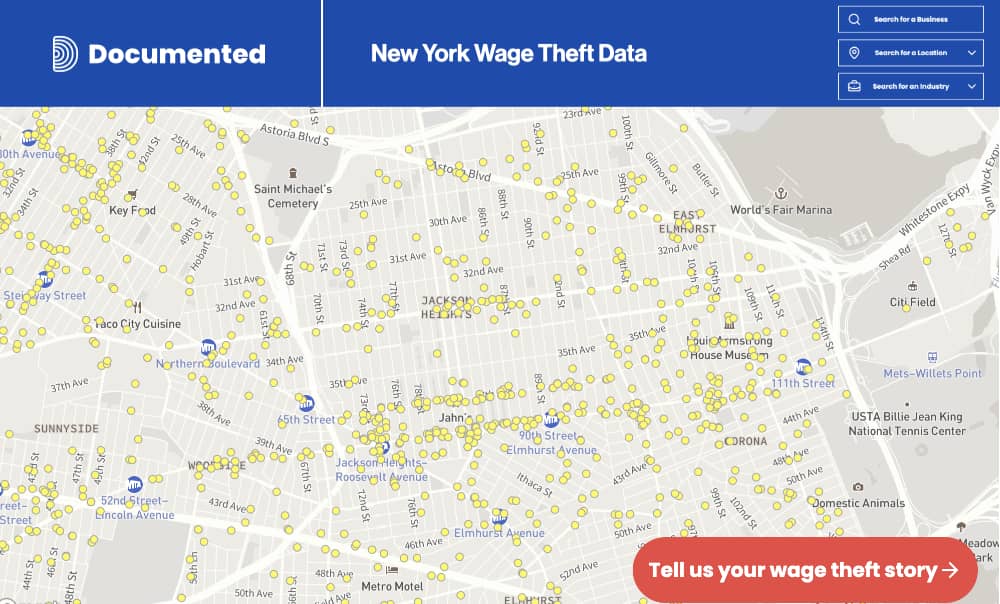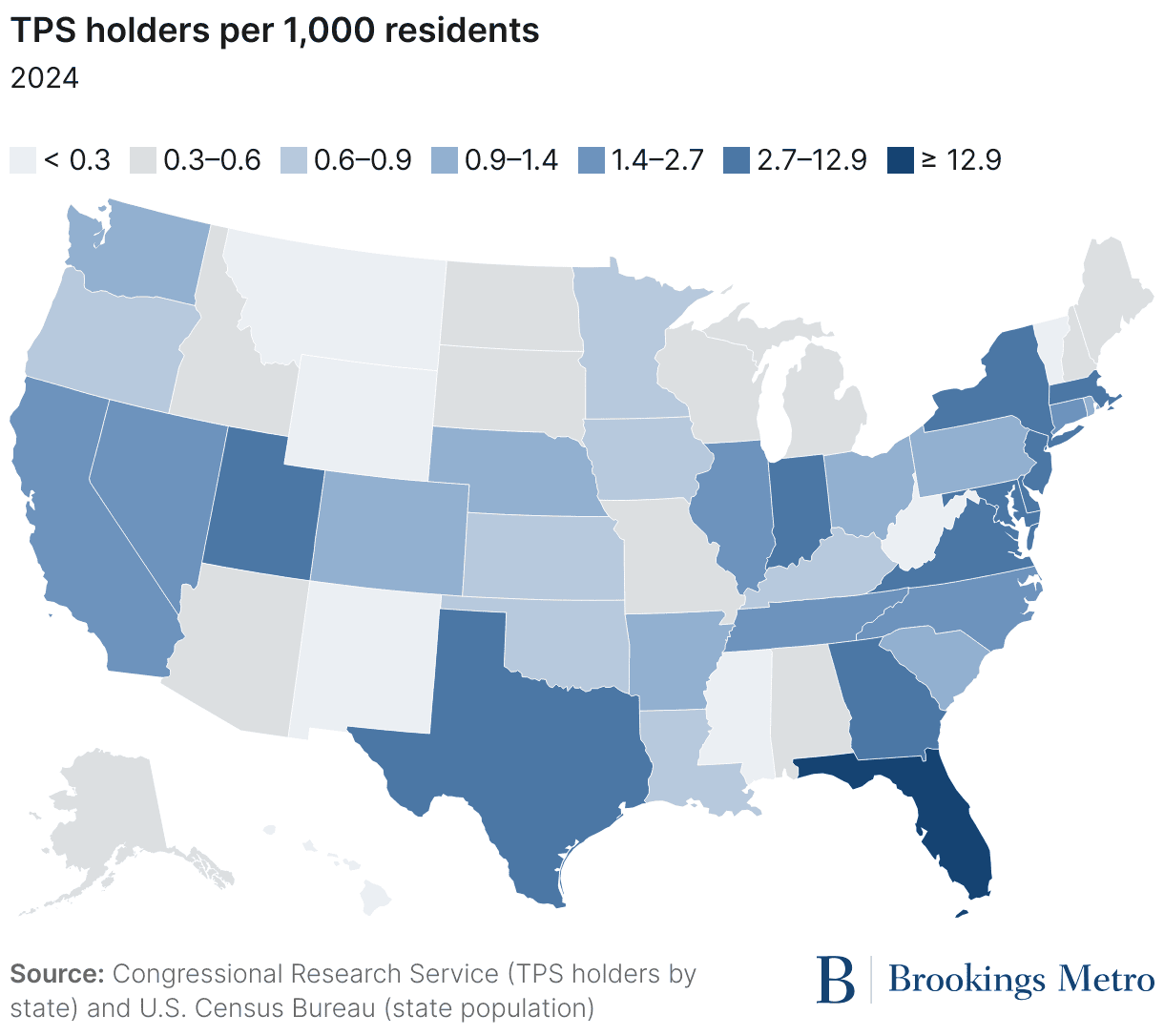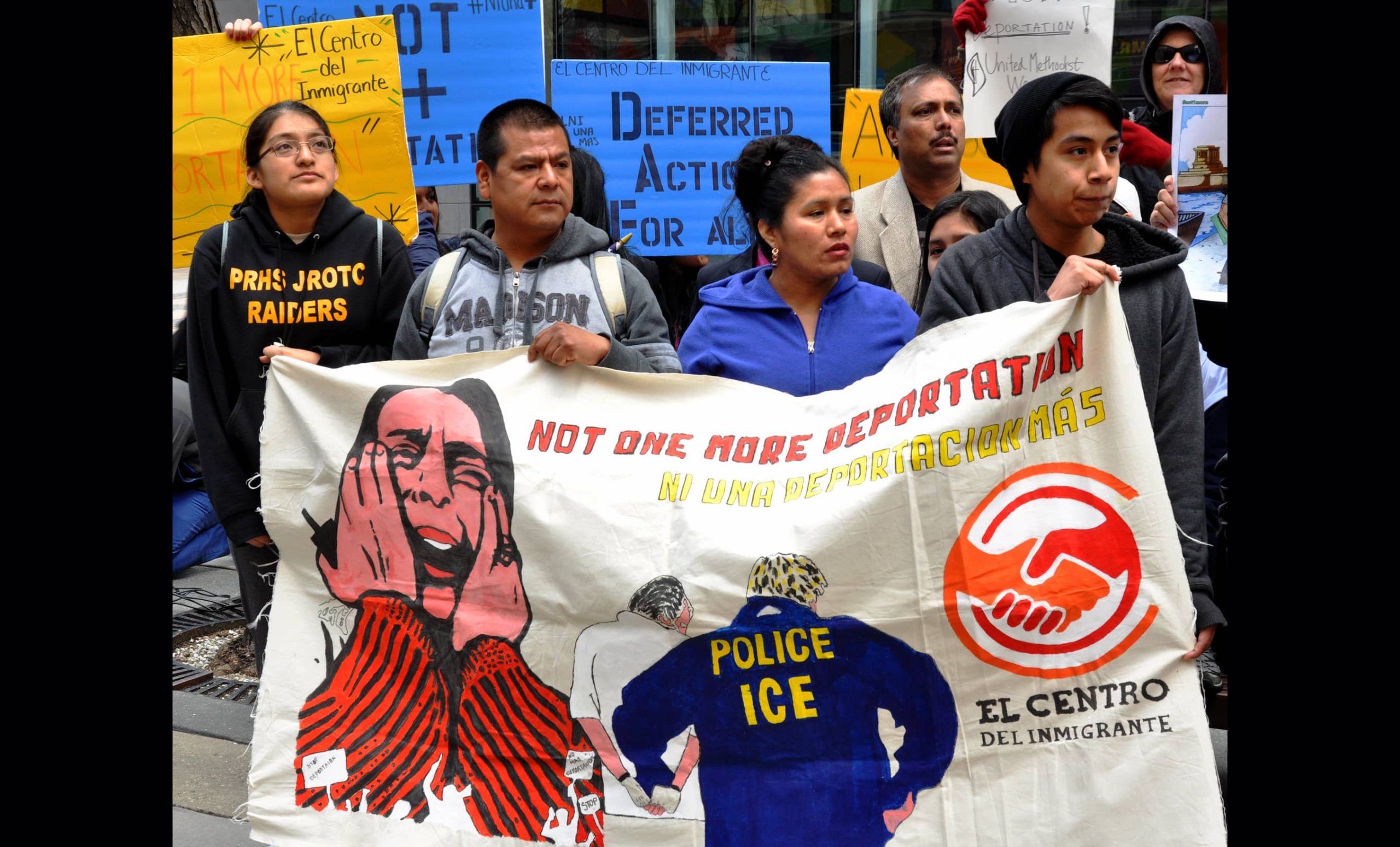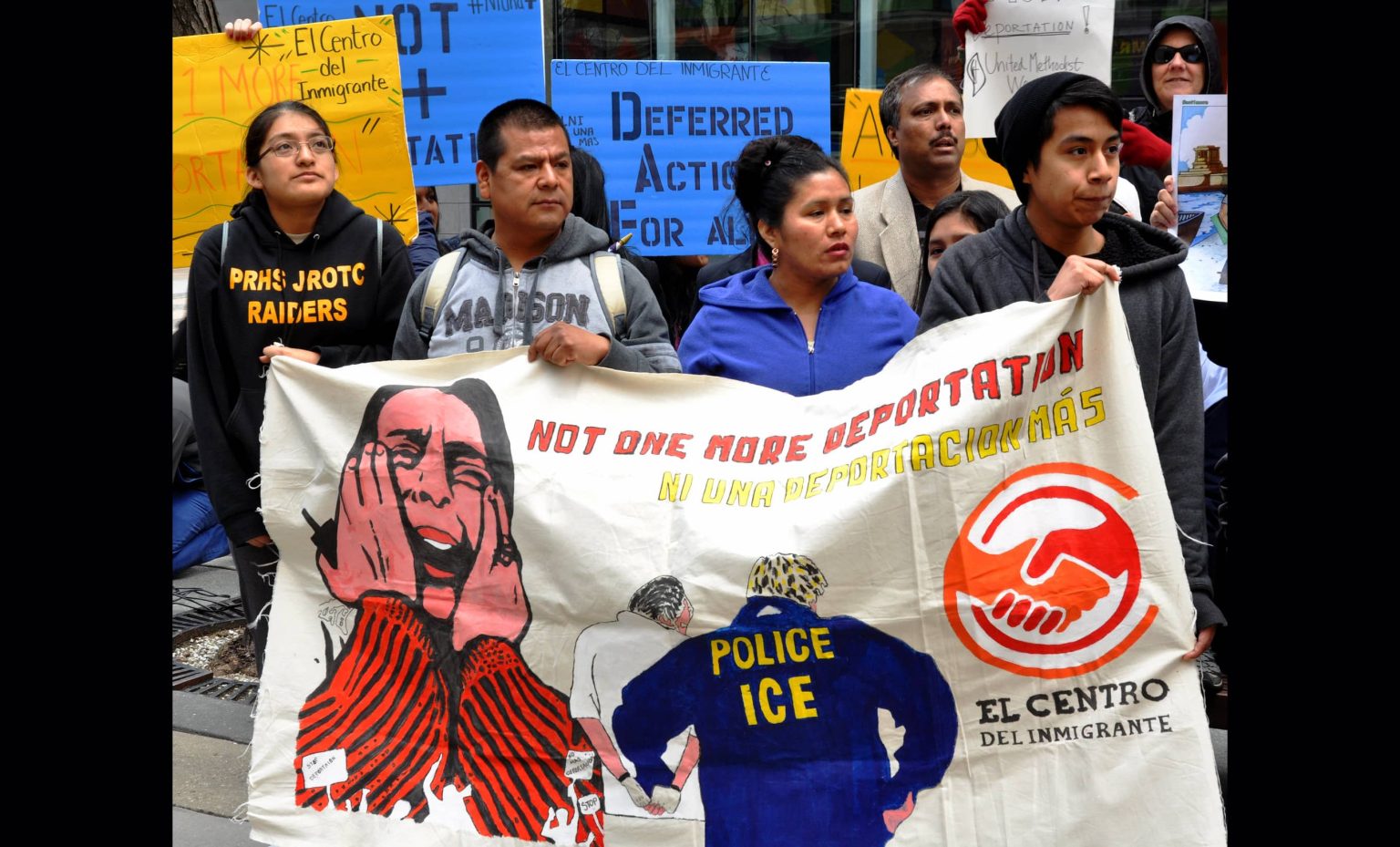
Dear friends,
Like many of you, we find ourselves at risk of being overwhelmed every week, sometimes daily, by immigration news. Much of it bad and some of it almost unbelievable. We continue to publish our monthly newsletter with a local focus whenever we can—looking at both the forces aligning against immigrant lives, and those allied with solidarity, resistance, and community-based care. None of it makes any sense without you, our readers, taking this news and acting when and where you can, for immigrant justice and power. Thank you for continuing to read the newsletter—and for using it as a tool in our common struggle.
Today’s issue takes on systematic wage theft—disproportionately experienced by immigrant workers—while highlighting how common it is in our own neighborhood. The newsletter also returns to the urgent issue of the Trump regime’s attempts to cancel Temporary Protective Status (TPS) for hundreds of thousands of legal immigrant US residents, including many in the Nepali community here in Queens.
Newsletter highlights:
- Wage theft is all around us
- Temporary Protective Status (TPS) under assault: an update
1. Wage Theft is All Around Us
Wage theft is rampant in industries that employ large numbers of immigrant workers. These include agriculture, building maintenance, garment assembly, hotel, restaurant and food service, construction, nursing homes, nail salons, warehouses and car washes. Inequality.org states the obvious: “Undocumented workers are particularly vulnerable to wage theft as they are often the least likely to report violations due to fear of retaliation, job loss, or exposure of their immigration status.” This has become an even more pressing consideration as the terror of the Trump regime’s mass deportation accelerates.
The Center for Popular Democracy reports that “An estimated 2.1 million New Yorkers are victims of wage theft annually, cheated out of a cumulative $3.2 billion in wages and benefits.” Wage theft among New York City’s 300,000 low-wage workers is reported to be roughly $18.4 million per week. The widespread nature of wage theft in the state and city can be visualized by clicking on Documented’s Wage Theft Monitor. The Monitor is based on state and federal data acquired through Freedom of Information requests. It records thousands of final wage theft settlements—large and small, in every neighborhood—including hundreds of findings against businesses in our area.
Examples of wage theft in Queens alone seem endless:
- In 2020, Desis Rising Up and Moving (DRUM) organized a large protest outside Sona Chaandi, one of the largest jewelry stores on 74th Street. Demonstrators accused the owners of sexual harassment, as well as wage theft. Nargis, an immigrant DRUM member and former employee, told the rally that she was harassed, paid $50 to $75 for 10 hour days, and forced to take care of the owner’s elderly parent without pay. The Documented Wage Theft Monitor shows that Sona Chaandi was eventually ordered to pay $65,000 to two unnamed workers.
- Some local eating and drinking establishments with immigrant work forces have faced large wage theft settlements. El Picosito Bar on Roosevelt was ordered to pay $237,621 to 10 workers a few years back. La Boina Roja Steakhouse was recently ordered by the state to pay $221,130 to 11 workers, according to the Wage Theft Monitor. National chain restaurants are also implicated. For instance, Chipotle on Northern Boulevard was ordered to reimburse 85 workers in a wage theft case filed in 2023.
- In 2022, Attorney General Letitia James announced a settlement of more than $90,000 in favor of several Astoria laundry workers. The Laundry Workers Center, which primarily represents immigrant women of color, did the initial investigation on the case and pushed it to the AG’s office.
- That same year, James also won a $130,000 settlement for two building superintendents in Flushing who were paid no wages at all—the owners had decided that a rent-free apartment would serve as their only compensation.
- Last year, Make the Road New York was instrumental in publicizing and filing a disturbing wage theft complaint by Ecuadorian migrants at a tobacco packaging factory in Queens. Workers assert that they were paid about $4 an hour, working in sweatshop conditions 10-13 hours a day, seven days a week.
- This summer, Assemblymember Shekar Krishnan took the lead in trying to terminate lucrative city contracts handed out to Griffin’s Landscaping, a firm accused of repeated wage theft and other illegal behavior.
Unfortunately, many ripped-off immigrant workers never get a legal settlement, or any kind of justice. Even those bold enough to file complaints with state or federal authorities face an uphill struggle. They may win their cases, which often take years, and yet the employer stalls, refuses to pay the judgement, hides, or declares bankruptcy.
“Hildalyn Colón Hernández, deputy director of New Immigrant Community Empowerment, a New York-based worker advocacy organization, said, ‘Employers are operating with no consequences’….Colón Hernández added that her organization now trains its employees on how to investigate wage theft because it would take too long if they had to rely on federal or state investigators to recover back wages.” —ProPublica, 8/22/23
WHAT CAN WE DO?
- Volunteer with or donate to NICE, Make the Road, the Laundry Workers Center and other local groups that defend immigrant workers from wage theft.
- Check out Documented’s Wage Theft Monitor to identify businesses found to have committed wage theft.
- Download or read the new Know Your Rights at Work booklet produced by Adhikaar and the Asian American Legal Defense and Education Fund.
2. The Impact of TPS Changes for NY
“The law is very clear that once the TPS extension has been granted, it cannot be taken away en masse. This is the first time in the 35-year history of the TPS statute that anyone’s ever tried to do that.” –Ahilan Arulanantham, co-director, Center for Immigration Law and Policy, UCLA School of Law
The Brookings Institute warned that Trump’s campaign promises targeting immigrants “would have disproportionate impacts on U.S. cities and urban areas, given that most foreign-born individuals live and work in these places.” Among US counties with undocumented populations, Queens is ranked the sixth-largest and has over three TPS holders per 1,000 people. (With a population of about 2,250,000, that amounts to over 6,750 TPS holders.) The Trump regime, led by Stephen Miller’s hard-line propaganda, aims to abruptly end TPS status for hundreds of thousands of US residents, which disproportionately threatens people living here in Queens and NYC.
About 40% of the migrants who arrived in NY in 2022-23 came from Venezuela under TPS protections. New York City has the second-largest TPS-eligible Haitian population in the nation, which comprises about 3% of the city’s population. Among other TPS recipients, New York City also has the largest Honduran population and, residing in both Woodside and Jackson Heights is the second-largest Nepali migrant population in the country. Around Flushing and Kew Gardens, there is a large population of Afghan immigrants in Queens.
These groups combined comprise 87,000 TPS holders in New York state who are specifically under threat from the questionable legal actions spearheaded by the Trump administration to strip their legal authorization to remain and work in the US, making them all detainable and deportable. The inappropriately named One Big Beautiful Bill, which barely received enough votes to become law, supplements these attacks by requiring higher fees for individuals to submit forms necessary to file in court to fight against potential deportation. The Showcase of Nepalis in New York (NepYork) published the full details of these cost increases. NepYork also reported on a recent NJ event organized to discuss increased deportation threats and the imminent termination of TPS for Nepalese immigrants.
“TPS is ending on August 5 [for Nepal], and thousands of lives are hanging by a thread. We organized this not just because the law is changing, but because our families are suffering silently. Many don’t know their rights. Many are scared. We have organized this event to help them find a way and let them know they are not alone.” Dr. Bishnu Maya Pariyar, Program Director at Hudson S.P.E.A.K.S.
Pushback against TPS terminations includes Maryland Senator Chris Van Hollen’s SECURE Act, introduced last month along with 30 other senators. The bill would secure a pathway to permanent residency and is supported by numerous unions, CASA, the National TPS Alliance, and the National Network for Arab American Communities. Additionally, in February, the Dream and Promise Act was resubmitted—a bipartisan bill supported by nearly 200 representatives that would protect DACA recipients as well as TPS holders.
On Monday, July 28, Queens Borough President Donovan Richards will hold a rally at 6:00 PM at Queens Borough Hall to support community members who are deeply affected by the terminations of Temporary Protected Status. Haitian-American City Councilmember Farah Louis has also spoken out against the efforts to end TPS. She notes that people fled their dangerous home countries, came here for a better life, they work for local businesses, and invest in the economy here—and now all that is about to be snatched away. Brad Lander, the NYC Comptroller, has published Protecting Our Neighbors, describing the humanitarian costs of cancelling TPS. His report also highlights the defunding by the Trump and Adams administrations of vital legal services used to protect over 1,800 children whose lives will be disrupted by this change.
Hundreds of thousands of TPS recipients, along with family members and supporters, await the outcome of the numerous challenges made in court by the National TPS Alliance, CASA, Haitian Americans United Inc., and the Haitian Evangelical Clergy Association as the clock ticks down towards deadlines that threaten to end their legal status.
| Country | Designation Date | Most Recent Action | Expiration Date | # Individuals |
|---|---|---|---|---|
| Afghanistan* | May 20, 2022 | Termination (5/13/25) | July 14, 2025 | 11,700 |
| Cameroon* | June 7, 2022 | Termination (6/4/25) | August 4, 2025 | 5,200 |
| Haiti* | Jan. 21, 2010 | Termination (7/1/25) | Sept. 2, 2025 | 348,187 |
| Honduras* | Jan. 5, 1999 | Termination (7/8/25) | Sept. 8, 2025 | 72,000 |
| Nicaragua* | Jan. 5, 1999 | Termination (7/8/25) | Sept. 8, 2025 | 4,000 |
| Nepal* | June 24, 2015 | Termination (6/6/25) | August 5, 2025 | 12,700 |
| Venezuela* | Oct. 3, 2023 (re-designation) | Termination (2/5/25) | Not applicable | 348,202 |
Table compiled by bhfs 7/22/2025
* Asterisks denote ongoing litigation
WHAT CAN WE DO?
- Local group DRUM has been organizing for 25 years and supports the Nepali population under threat from TPS terminations. Join their 25×25 campaign and have 25 of your own contacts donate $25 to support their work.
- The National TPS alliance includes, among others, the National Day Laborer Organizing Network (NDLON), Adhikaar and the Haitian Bridge Alliance. If you are able, consider donating to any or all of these organizations.
- Attend the rally this Monday, July 28, at 6pm at Queens Borough Hall to demand continued TPS protections for immigrant neighbors.
In solidarity and with collective care,
Jackson Heights Immigrant Solidarity Network (JHISN)
Follow @JHSolidarity on Facebook and Twitter and share this newsletter with friends, families, neighbors, networks, and colleagues so they can subscribe and receive news from JHISN.


